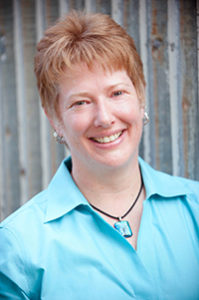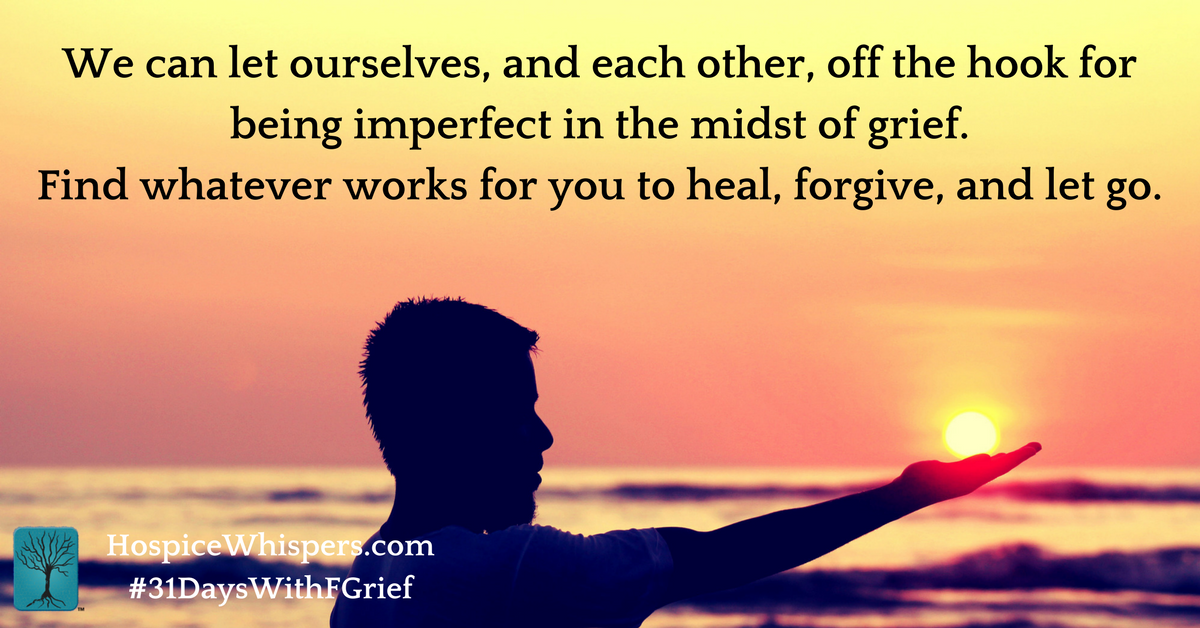31 Days of Walking with Grief: Others’ and Our Own
Day 31—Regrets, Forgiveness, and Finding Peace
This is a month-long series to support persons grieving and those who love them. It includes content from “Sharing Our Stories: A Hospice Whispers Grief Support Workbook” available through Amazon and wherever books are sold.
I could not imagine a better way to close than by sharing one of the last section of the grief workbook with you in its entirety. It also includes a related excerpt from the Hospice Whispers book.
It deals with any remaining regrets or grudges, toward others or ourselves, that we might need to do something with so we can let it go and be free to move on with our healing.
I hope you find it helpful in some small way.
To Be Clear, from Sharing Our Stories: A Hospice Whispers Grief Support Workbook.
Are there ways in which you feel somehow inadequate or still hold regrets from how you handled your particular situation? How might you let go of those feelings of inadequacy and accept that you did the best you could at the time with the information you had in the circumstance you faced? How might you learn from those moments when you feel you were not your best self so as to transform what seems like a negative into something beneficial?
Some persons find that ritual can be helpful to choose a different way to see or feel about something from the past that cannot be changed. Writing a list of regrets and putting them into a G-d box or burning it or scattering it
to the wind or on the water is a way that many have found to let go.
Find whatever feels right for you, but please find something. A loved one has died. It is done. And decisions get made during times of stress based on instinct and the best information we have. We get to let ourselves off the hook for being imperfect.
Certainly, if damage was done to someone else and true guilt is present over not acting as you normally prefer to with others, then it can be a very healing and freeing thing to make amends. Apologize, without excuse. Simply say, “I’m sorry, I hope you’ll forgive me,” or, “How can we make things right again?” This is a scary but important process which is good not just for them, but also for you!
Find a way to free yourself from judgments—others’ and your own. If shame is hovering around, bring it into the light. Shame loves dark corners to hide in. Brene Brown has some fabulously helpful and well-researched concepts regarding shame, vulnerability, and authenticity. From her writings, which include: The Gifts of Imperfection, Daring Greatly, and Rising Strong to her speaking at either of her TED Talks or on her audiobook, The Power of Vulnerability, Brene’s wisdom may help you find healing and hope in areas where you are being held captive by the past.
Again, if you’ve been working through this workbook alone and find struggles coming up that may need more support than words on a page can provide, please contact a local hospice and ask about grief counseling services available in your area. Find safe spaces for your emotions to breathe and feel heard and accepted, rather than be judged. Find places where you can talk until you can hear yourself, and make more sense out of what you have experienced and find yourself experiencing, still.
As we come toward the end of this workbook, hear the closing words once again from the piece “To Be Clear” as it was first introduced in Hospice Whispers: Stories of Life:
“This book was intended to point to the rich gifts and experiences that punctuate what seems to the outside world as an impossibly sad job. My hope was to make death seem a little less scary, to make hospice just a little better understood, to help families and even patients feel just a little more prepared for what the process can look like.
But to be clear, it ain’t always puppies and ponies. I am good at what I do, but I am by no means the best or wisest chaplain I know. This book isn’t intended to be a made for a television movie in which the ending is all neatly tied up with a delicate bow. So please, do not hold yourself as a patient, family, or professional caregiver to a standard that isn’t real. We look for the gifts and beauty and perfection in the midst of all the messy imperfection and seek to learn from it all—the seemingly ‘good’ and the seemingly ‘bad.’
As artist, Salvador Dali said, ‘Have no fear of perfection—you’ll never reach it.’ Thankfully, we do not need to.”
I hope something of this series has been helpful to you and, as always, I appreciate you joining me on this journey. I hope you’ll continue to follow my blogs at carlacheatham.com, hospice whispers.com, and hospicetimes.com (select my name under the “Guest Articles” tab).
Please consider getting your copy of Sharing Our Stories: A Hospice Whispers Grief Support Workbook today! Group discounts of 25% are available for both the Hospice Whispers book and workbook for orders of 7 or more at hospicewhispers.com.
I look forward to staying in touch.
Peace,
Carla
 Rev. Carla Cheatham, MA, MDiv, PhD, TRT has served hospices as a chaplain and bereavement coordinator. She’s the Section Leader for the Spiritual Caregivers Section of the National Hospice and Palliative Care Organization and an adjunct professor at the Seminary of the Southwest. Through her Carla Cheatham Consulting Group, Carla provides training and consulting for professional caregivers nationwide. She is the author of Hospice Whispers: Stories of Life and its companion volume, Sharing Our Stories: A Hospice Whispers Grief Support Workbook. Her next book, On Showing Up with Suffering: Others’ and Our Own, is set to publish in 2017.
Rev. Carla Cheatham, MA, MDiv, PhD, TRT has served hospices as a chaplain and bereavement coordinator. She’s the Section Leader for the Spiritual Caregivers Section of the National Hospice and Palliative Care Organization and an adjunct professor at the Seminary of the Southwest. Through her Carla Cheatham Consulting Group, Carla provides training and consulting for professional caregivers nationwide. She is the author of Hospice Whispers: Stories of Life and its companion volume, Sharing Our Stories: A Hospice Whispers Grief Support Workbook. Her next book, On Showing Up with Suffering: Others’ and Our Own, is set to publish in 2017.



Leave a Reply